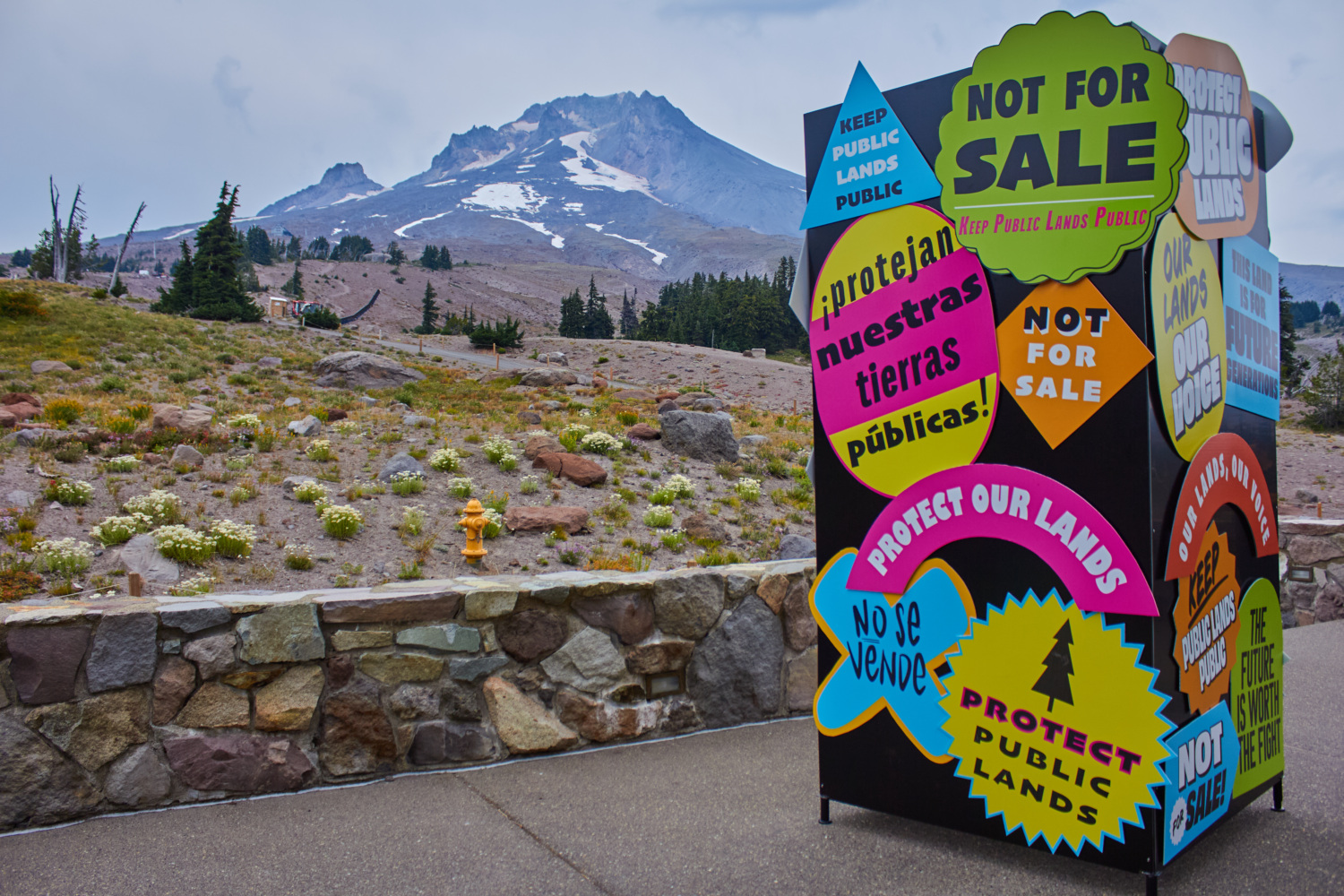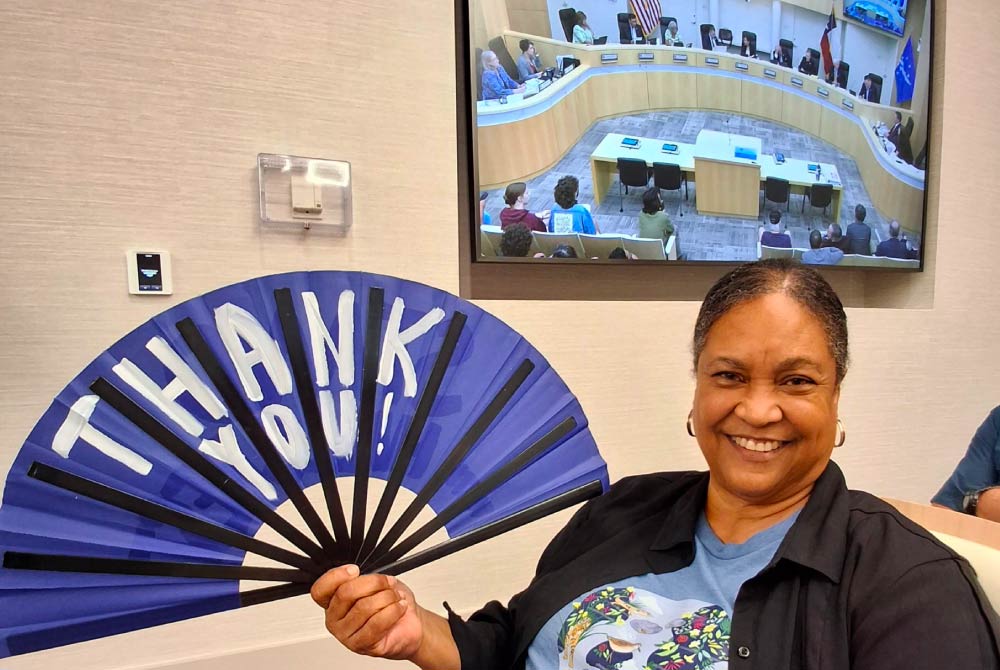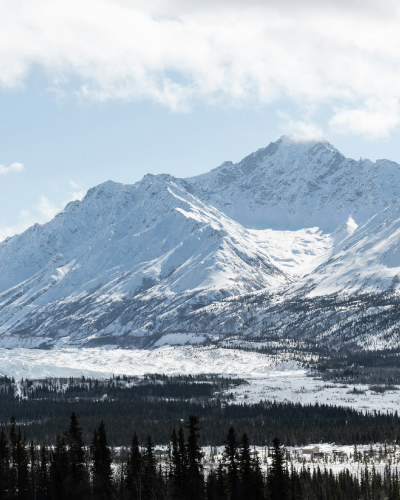
Good Climate News for September 2025: States’ clean energy creativity, public lands expansion, and pollution defense
Sep 30, 2025
 Community members like Monna worked alongside LCV’s Chispa Texas program to protect clean and affordable water for Corpus Christi. She’s shown here expressing her appreciation as the city council votes on the monitor behind her.
Community members like Monna worked alongside LCV’s Chispa Texas program to protect clean and affordable water for Corpus Christi. She’s shown here expressing her appreciation as the city council votes on the monitor behind her.
Each month, LCV shares five stories about the impact of our work. This month, we’re focusing on a clean water win in Texas, expanded solar access in New Jersey, how we’re getting money out of politics in Michigan, democracy wins in 20 states, and how we’re organizing nationwide to protect public lands.
LCV’s Chispa Texas program successfully collaborated with local organizations to protect coastal ecosystems and frontline communities from a damaging and costly water desalination plant.
Chispa Texas helped secure this win by:
The coalition’s persistence won support from elected officials across the political spectrum, as evidenced by this video of Corpus Christi Councilwoman Carolyn Vaughn voicing her support:
Despite mounting victories over several years, the permit for the desalination plant remains active, and the polluting industries that would benefit from the plant aren’t giving up. Chispa Texas and local partners are now working to get the permit pulled to finally put an end to this proposed project.
Related: Read about Chispa Texas’ recent victory halting nearby heavy industrial rezoning.
LCV’s state affiliate helped push forward recent legislation that will nearly quadruple community solar capacity in the Garden State — providing cheaper, cleaner solar power to hundreds of thousands more homes.
Community solar allows homeowners and businesses to buy into shared, offsite solar projects and reap the cost savings of clean energy on their power bills. This provides access to solar power for those who are unable to install solar panels on their properties, such as renters and residents of multi-family buildings, and removes the barrier of installation costs.
LCV’s state affiliate, New Jersey LCV, has been at the forefront of advancing New Jersey’s clean energy future since 2018, when LCV’s Clean Energy for All (CEFA) campaign was launched. The CEFA campaign, which was piloted in New Jersey during Trump’s first term, works to secure state and local policy solutions that promote the development of clean energy and phase out the use of fossil fuels in more than 30 states. Today, more than 40% of people in the U.S. live in places committed to 100% clean energy, up from 1% before we launched our campaign.
New Jersey LCV helped get the community solar legislation passed by:
New Jersey has about 180 megawatts of community solar power online, and an additional 720 megawatts of planned projects. This legislation builds on this success:
According to Governor Phil Murphy, “Today there are roughly 650,000 homes throughout the Garden State that are powered by solar energy. With these bills, we’re going to increase that number to 1 million homes by 2028.”
Related: New Jersey Increases Energy Storage While Reining in Costs for Ratepayers
LCV’s state affiliate, Michigan League of Conservation Voters (MLCV), is advancing a ballot initiative that aims to prohibit polluters from contributing to political campaigns.
Getting corporate money out of elections helps ensure that elected officials answer to the communities they serve.
To combat the climate crisis and protect our democracy, we need a government that hears, protects, and reflects the people it represents. To this end, LCV and our 30+ state affiliates work to safeguard and expand access to the voting booth by organizing, mobilizing, and advocating for strong pro-democracy policies across the country. This year, we’ve scored some major victories.
Colorado: Conservation Colorado worked alongside leading state democracy partners to help pass a state Voting Rights Act that provides legal protections for voters of color and oversight for local election administration.
Michigan: Michigan League of Conservation Voters engaged the public, lawmakers, and the media to defeat a resolution that would have imposed new, onerous barriers to voting — including requiring proof of citizenship, like a passport or birth certificate, when registering.
Washington: Washington Conservation Action brought together four coalitions to win the expansion of automatic voter registration to include Tribal entities and the state health authority.
Virginia: Virginia League of Conservation Voters led multiyear coalition efforts that helped pass the Restoration of Rights constitutional amendment resolution. This resolution creates a path for Virginians to vote on whether or not to restore the right to vote to formerly incarcerated individuals.
In addition to the victories outlined above, LCV’s state affiliates helped pass or protect pro-democracy legislation in Alaska, Arizona, California, Connecticut, Georgia, Idaho, Maryland, Maine, Minnesota, Montana, Nebraska, New Mexico, South Carolina, Utah, Vermont, and Wisconsin.
LCV’s state affiliates are engaged across the country, including in Indiana, Maine, New Jersey, Ohio, and Pennsylvania, where we are:
Last month, LCV launched a nationwide campaign to protect our irreplaceable public lands and waters from the Trump administration’s ongoing attacks.
Our most recent event was hosted by LCV and Chispa Arizona during an annual Latine community Grand Canyon camping trip. Events like these are critically important for raising awareness about the Trump administration’s threats to our public lands, lakes, rivers, and coasts.
Chispa Arizona Federal Organizer Dana Orozco reflected, “This weekend we saw that people are united in the defense of our lands and waters from greedy corporations that want to extract resources and ruin them in the name of profit. We stand in solidarity with our Indigenous relatives, who are impacted first by the destruction and pollution of the natural resources they depend on, and to our future generations who deserve to experience the beauty and sacredness of our lands.”
The Best Thing You Can Do Right Now
Our nation’s national parks, monuments, and protected wilderness areas span more than 600 million acres — and include important habitats, historical and cultural sites, and clean water sources. The Trump administration and its allies in Congress want to expand oil and gas drilling, logging, and coal mining in these irreplaceable places. Tell your members of Congress to protect public lands.
Protect Public Lands